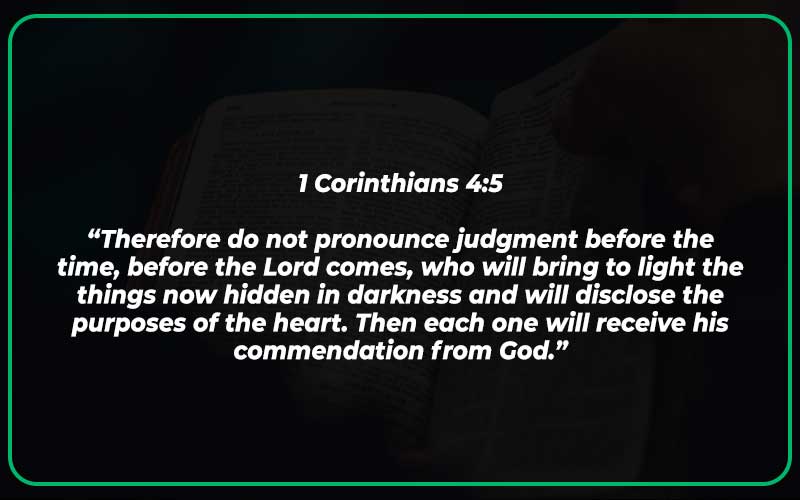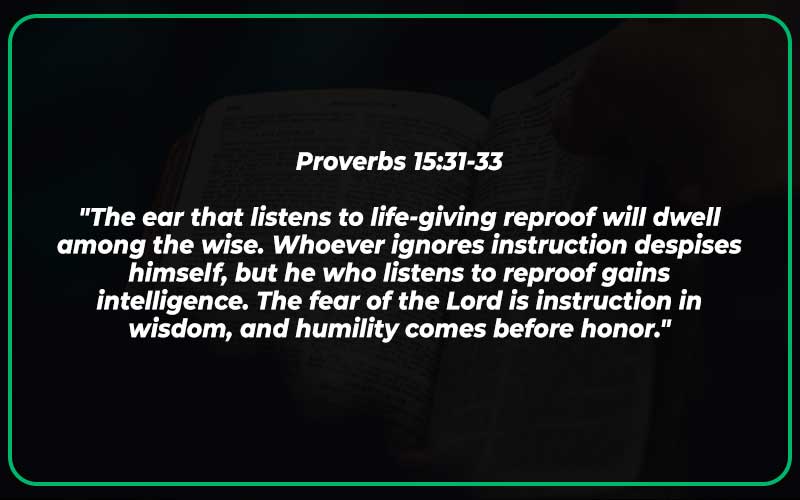Judging others is a common human tendency, but the Bible cautions us against it. Instead, it encourages us to focus on self-reflection and treating others with love and compassion.
In this blog post, we will delve into various Bible verses that shed light on the topic of judging and provide valuable insights on how we can better relate to others without passing judgment.
Also Read: Bible Verses About Service
Bible Verses About Judging
Matthew 7:1-2
“Judge not, that you be not judged. For with the judgment you pronounce you will be judged, and with the measure you use it will be measured to you.”
Jesus teaches in this passage that we should not judge others because we will be judged by the same standard and measure that we use to judge others. This verse is a reminder that we do not have the authority to place ourselves above others and condemn them.
John 7:24
“Do not judge by appearances, but judge with right judgment.”
Here, Jesus tells us to judge with right judgment and not base our opinions on superficial things like appearances. We are to evaluate situations and people based on God’s truth and not our own biases or assumptions.
Romans 2:1
“Therefore you have no excuse, O man, every one of you who judges. For in passing judgment on another you condemn yourself, because you, the judge, practice the very same things.”
This verse reminds us that we are not without fault and should not judge others, for we are guilty of the same things. We should focus on our own repentance and growth instead of judging others.
James 4:12
“There is only one lawgiver and judge, he who is able to save and to destroy. But who are you to judge your neighbor?”
We should leave judgment to God, who is the only true and just judge. This verse reminds us that we are not in a position to judge others, as we are all sinners in need of grace.
Galatians 6:1
“Brothers, if anyone is caught in any transgression, you who are spiritual should restore him in a spirit of gentleness. Keep watch on yourself, lest you too be tempted.”
This verse instructs us to approach others gently and with humility if we see them struggling with sin. We should seek to help them grow and change instead of condemning them.
1 Corinthians 4:5
“Therefore do not pronounce judgment before the time, before the Lord comes, who will bring to light the things now hidden in darkness and will disclose the purposes of the heart. Then each one will receive his commendation from God.”
This verse reminds us that only God truly knows the intentions of the heart and the full extent of someone’s actions. Therefore, we should not rush to judge others but leave the ultimate judgment to God.

Proverbs 31:9
“Open your mouth, judge righteously, defend the rights of the poor and needy.”
This verse instructs us to seek justice and defend the rights of those who are marginalized and in need. We are called to use righteous judgment to bring about positive change and help those who are oppressed.
Romans 14:13
“Therefore let us not pass judgment on one another any longer, but rather decide never to put a stumbling block or hindrance in the way of a brother.”
We should not put obstacles in front of our brothers and sisters in Christ, but instead, we should encourage and support one another in our faith journeys. This verse teaches us to prioritize the unity of the body of Christ over our own personal opinions or judgments.
Isaiah 11:3-4
“And his delight shall be in the fear of the Lord. He shall not judge by what his eyes see, or decide disputes by what his ears hear, but with righteousness he shall judge the poor, and decide with equity for the meek of the earth.”
This verse describes the coming of a righteous ruler who will judge with equity and fairness. It teaches us to prioritize justice and treating people fairly over superficial judgments based on outward appearances or hearsay.
Matthew 7:3-5
“Why do you see the speck that is in your brother’s eye, but do not notice the log that is in your own eye? Or how can you say to your brother, ‘Let me take the speck out of your eye,’ when there is the log in your own eye? You hypocrite, first take the log out of your own eye, and then you will see clearly to take the speck out of your brother’s eye.”
This passage reminds us to examine our hearts and actions before judging others. We must seek to remove the sin in our own lives before confronting others about their shortcomings.
James 2:1-4
“My brothers, show no partiality as you hold the faith in our Lord Jesus Christ, the Lord of glory. For if a man wearing a gold ring and fine clothing comes into your assembly, and a poor man in shabby clothing also comes in, and if you pay attention to the one who wears the fine clothing and say, “You sit here in a good place,” while you say to the poor man, “You stand over there,” or, “Sit down at my feet,” have you not then made distinctions among yourselves and become judges with evil thoughts?”
We should not show favoritism towards people based on their outward appearance or social status. Judging people based on superficial things is ungodly and goes against the teachings of Christ.
John 12:47
“If anyone hears my words and does not keep them, I do not judge him; for I did not come to judge the world but to save the world.”
Jesus came to save the world, not to judge it. We should follow His example and strive to love and serve others instead of judging them.
Proverbs 15:31-33
“The ear that listens to life-giving reproof will dwell among the wise. Whoever ignores instruction despises himself, but he who listens to reproof gains intelligence. The fear of the Lord is instruction in wisdom, and humility comes before honor.”
This passage teaches us to listen to wise counsel and correction, even if it stings. Instead of immediately judging and rejecting feedback, we should humbly consider it and allow it to shape us in wisdom and humility.

1 Samuel 16:7
“But the Lord said to Samuel, ‘Do not look on his appearance or on the height of his stature, because I have rejected him. For the Lord sees not as man sees: man looks on the outward appearance, but the Lord looks on the heart.”
This verse reminds us that God sees beyond our outward appearance and knows the true state of our hearts. We should aim to see others as God does and not rush to make superficial judgments based on appearances.
Proverbs 21:2
“Every way of a man is right in his own eyes, but the Lord weighs the heart.”
This verse reminds us that our perceptions and judgments can be clouded by our own subjectivity. Only God sees the true intentions and motives of the heart, and we should seek to align our own judgments with His truth.
1 Corinthians 6:2-3
“Or do you not know that the saints will judge the world? And if the world is to be judged by you, are you incompetent to try trivial cases? Do you not know that we are to judge angels? How much more, then, matters pertaining to this life!”
This passage reminds us that as Christians, we are called to make judgment calls in certain situations, but it is important to do so with wisdom and discernment from God.
Proverbs 19:27
“Cease to hear instruction, my son, and you will stray from the words of knowledge.”
This verse teaches us the importance of listening to wise instruction and correction. When we do not listen to sound advice, we risk making poor judgments and straying from the truth.
Proverbs 17:15
“He who justifies the wicked and he who condemns the righteous are both alike an abomination to the Lord.”
We must be careful not to justify sin or condemn those who are righteous. This verse teaches us to have discernment in our judgments and to avoid extremes that go against God’s truth and justice.

What Does the Bible Say About Judging?
The Bible addresses the topic of judging in several passages, emphasizing different aspects of judgment. In general, it advises caution and humility when making judgments about others.
1. Avoiding Hypocrisy: Jesus taught in the New Testament that individuals should first address their own shortcomings before focusing on the faults of others. This teaching is often summarized as “Do not judge, or you too will be judged.” (Matthew 7:1) This verse suggests that a critical attitude can lead to one’s own judgment in return.
2. Fair and Just Judgment: While cautioning against hypocritical judgment, the Bible also recognizes the need for discernment and accountability. In John 7:24, Jesus advises, “Stop judging by mere appearances, but instead judge correctly.” This implies that judgment should be fair, just, and based on accurate information rather than superficial assumptions.
3. Merciful Attitude: The Bible encourages believers to show mercy and forgiveness, as God’s mercy is extended to them. James 2:13 states, “Mercy triumphs over judgment.” This indicates that a compassionate and forgiving attitude should prevail over a harsh and unforgiving judgment of others.
4. Restoring and Correcting: Galatians 6:1 advises, “Brothers and sisters, if someone is caught in a sin, you who live by the Spirit should restore that person gently.” This suggests that while judgment should be avoided, there’s a responsibility within the community to help restore and correct those who are struggling.
5. Spiritual Discernment: The Bible also encourages spiritual discernment and the evaluation of teachings and behaviors in light of biblical principles. In 1 Corinthians 2:15, Paul writes, “The person with the Spirit makes judgments about all things.” This implies that believers, guided by the Holy Spirit, can discern between right and wrong.
In summary, the Bible advises against a harsh and hypocritical judgment of others, while also acknowledging the importance of fair discernment, accountability, and merciful attitudes. It emphasizes the need to approach judgment with humility, considering one’s own imperfections and relying on the guidance of the Holy Spirit.

